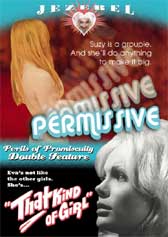 PERMISSIVE
(1971)/THAT KIND OF GIRL (1963)
PERMISSIVE
(1971)/THAT KIND OF GIRL (1963)Directors: Lindsay Shonteff/Gerry O’Hara
Kino Lorber/Redemption
 PERMISSIVE
(1971)/THAT KIND OF GIRL (1963)
PERMISSIVE
(1971)/THAT KIND OF GIRL (1963)Redemption Films relaunches their Jezebel Films line under new distributor Kino Lorber with a British exploitation double bill DVD of Lindsay Shonteff’s groupies-gone-wrong fable PERMISSIVE and Gerry O’Hara’s VD-scare film THAT KIND OF GIRL.
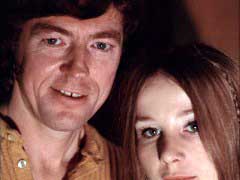
PERMISSIVE focuses on Suzy (Maggie Stride, LAYOUT FOR FIVE MODELS) who comes to London to stay with her groupie friend Fiona (Gay Singleton, YELLOW DOG), who is in a clingy relationship with Forever More singer Lee (Alan Gorrie of Average White Band). Suzy hooks up with sleazy band manager Jimi (Gilbert Wynne, THE BULLET MACHINE), but he doesn’t want to bring her along on the next gig. Fiona sets Suzy up to stay with the band Titus Groan until she gets back, but head groupie Lacy (Debbie Bowen) gets jealous and tosses her out. Homeless, Suzy wanders around the city panhandling with Zen wannabe-singer Pogo (Robert Daubigney) until he is killed in a road accident. When Fiona and Forever More return, Suzy plunges headlong into the groupie lifestyle, hooking up with Lee’s bandmates Kip (Stuart Francis) and Onnie (Onnie Mair) as well as the lead singer of Titus Groan (seemingly to get back at Lacy). When Suzy sets her sights next on Lee, she is unaware of the chain of tragic events she is about to set in motion.
 Reportedly
shot under the working title SUZY SUPERSCREW (like that would have gotten past
the BBFC), PERMISSIVE allows stodgy Canadian–born director Lindsay Shonteff
to experiment with music video montage and flash-cut nonlinear editing. Shonteff’s
career took off with the western THE HIRED GUN in his native Canada, and that
film soon found him work in the UK through producer Richard Gordon with the
double bill of DEVIL DOLL and CURSE OF THE VOODOO (both starring American actor
Bryant Halliday, who also co-founded Janus Films), followed by the spy spoofs
THE SECOND BEST SECRET AGENT IN THE WHOLE WIDE WORLD and THE MILLION EYES OF
SU-MARU (for Harry Alan Towers, who also produced its follow-up THE GIRL FROM
RIO directed by Jess Franco). PERMISSIVE was actually his third sexploitation
film, preceded by THE YES GIRLS and the modern-day Jack the Ripper pic NIGHT
AFTER NIGHT AFTER NIGHT – also featuring Wynne – which was exported
to certain territories in a more explicit “continental” version.
After the more serious THE FAST KILL and SPY STORY (based on a novel by Len
Deighton), Shonteff returned to spy spoofs with THE MAN FROM S.E.X., NO. 1 OF
THE SECRET SERVICE, and BIG ZAPPER. His directorial efforts during the 1980s
and 1990s were more sparse and he only directed two more features in the new
millennium (ICE COLD IN PHOENIX and ANGELS, DEVILS & MEN) before his death
in 2006. Writer John Craig Dryden’s only other writing credit is Shonteff’s
RUN WITH THE WIND, but there’s not really much of a script here.
Reportedly
shot under the working title SUZY SUPERSCREW (like that would have gotten past
the BBFC), PERMISSIVE allows stodgy Canadian–born director Lindsay Shonteff
to experiment with music video montage and flash-cut nonlinear editing. Shonteff’s
career took off with the western THE HIRED GUN in his native Canada, and that
film soon found him work in the UK through producer Richard Gordon with the
double bill of DEVIL DOLL and CURSE OF THE VOODOO (both starring American actor
Bryant Halliday, who also co-founded Janus Films), followed by the spy spoofs
THE SECOND BEST SECRET AGENT IN THE WHOLE WIDE WORLD and THE MILLION EYES OF
SU-MARU (for Harry Alan Towers, who also produced its follow-up THE GIRL FROM
RIO directed by Jess Franco). PERMISSIVE was actually his third sexploitation
film, preceded by THE YES GIRLS and the modern-day Jack the Ripper pic NIGHT
AFTER NIGHT AFTER NIGHT – also featuring Wynne – which was exported
to certain territories in a more explicit “continental” version.
After the more serious THE FAST KILL and SPY STORY (based on a novel by Len
Deighton), Shonteff returned to spy spoofs with THE MAN FROM S.E.X., NO. 1 OF
THE SECRET SERVICE, and BIG ZAPPER. His directorial efforts during the 1980s
and 1990s were more sparse and he only directed two more features in the new
millennium (ICE COLD IN PHOENIX and ANGELS, DEVILS & MEN) before his death
in 2006. Writer John Craig Dryden’s only other writing credit is Shonteff’s
RUN WITH THE WIND, but there’s not really much of a script here.
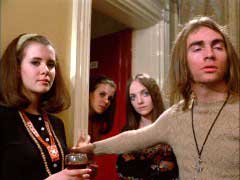
Five songs by Forever More are featured from their first album YOURS – FOREVER MORE, but half way through the film’s running time, the non-stop soundtrack and musical montages begin to wear on the nerves. While the incessant flash-forwards telegraph the fates of some of the characters, the problem isn’t a lack of suspense (you’ll still wonder just what turn of events cause them to arrive at their ends); the problem is that these bits and their placement seem to hammer the point that “permissive” behavior always leads to bad ends. It’s hard to believe that any counter-culture band would sign onto a project like this (although the working title might have suggested something lighter and more subversive). Stride looks a bit like Lynn Lowry (I DRINK YOUR BLOOD), but Stride’s blank demeanor is more off-putting then enigmatic; as such, just about every other character – no matter how bitchy – come across as more sympathetic (particularly Singleton). TWINS OF EVIL’s Madeleine and Mary Collinson pop up in the climactic scene for a handful of shots; they don’t get to do anything, but they are nevertheless striking. Other groupies include Samantha Bond (UP POMPEI), Linda Dean (THE YES GIRLS), Juliet Adams (THE LOVE FACTOR) and Suzy Randall (who may or may not be erotic model turned photography Suze Randall).
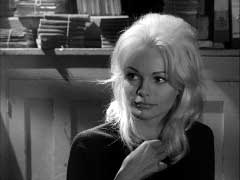 In
THAT KIND OF GIRL, Austrian au-pair Eva (Margaret Rose Keil, WOMEN OF DEVIL’S
ISLAND) gets chatted up by fellow polytechnic student/library assistant Max
(Frank Jarvis, THE ITALIAN JOB) and they go out dancing. Inexperienced Max quickly
finds himself vying for Eva’s attention with urbane ad executive Elliot
(Peter Burton, DR. NO). When not caring for her young charge Nicholas (Steven
Stocker) – the toddler son of the Millars (Sylvia Kay and David Davenport)
– Eva alternately dates both men. Eva accompanies Max on a weekend “Ban
the Bomb” march but quickly tires of walking for hours and sleeping on
floors. She misses her bus back to London, but gets a ride from young Keith
(David Weston, MASQUE OF THE RED DEATH). Keith is frustrated because his girlfriend
Janet (Linda Marlowe, PENELOPE PULLS IT OFF) wants to wait to have sex until
after marriage so he breaks up with her and meets up with Eva at her favorite
nightclub hangout. Things start out innocently until Eva sees Elliot –
who has been away on a business trip for two weeks and has not called her –
chatting up another girl. She invites Keith to a party in the country where
they go swimming and make love. Returning to town, Eva runs into Elliot who
calls her a tramp and tries to rape her but she is saved by the arrival of a
police officer. Eva states that she did not recognize her attacker, and it is
recommended that she get looked at by the police surgeon as a precaution. Sometime
later, she finds herself called to a private clinic where a doctor (John Wood,
JUST LIKE A WOMAN) reveals that her blood test is positive for syphilis. Eva
is not only devastated about contracting the disease, but also having to contact
the men she has been with, and the possibility that she might have passed it
on to Nicholas or his parents. The Millars prove understanding and supportive,
and Eva undergoes treatment; however, Elliot – after receiving his clinic
notice – begins threatening her over the phone. The Millars convince Eva
to tell the police about Elliot, but they are unable to trace him. However,
Elliot may be the least of her worries when tightly-wound Max and Keith –
who has gotten back together with Janet and impregnated her – get their
clinic notices.
In
THAT KIND OF GIRL, Austrian au-pair Eva (Margaret Rose Keil, WOMEN OF DEVIL’S
ISLAND) gets chatted up by fellow polytechnic student/library assistant Max
(Frank Jarvis, THE ITALIAN JOB) and they go out dancing. Inexperienced Max quickly
finds himself vying for Eva’s attention with urbane ad executive Elliot
(Peter Burton, DR. NO). When not caring for her young charge Nicholas (Steven
Stocker) – the toddler son of the Millars (Sylvia Kay and David Davenport)
– Eva alternately dates both men. Eva accompanies Max on a weekend “Ban
the Bomb” march but quickly tires of walking for hours and sleeping on
floors. She misses her bus back to London, but gets a ride from young Keith
(David Weston, MASQUE OF THE RED DEATH). Keith is frustrated because his girlfriend
Janet (Linda Marlowe, PENELOPE PULLS IT OFF) wants to wait to have sex until
after marriage so he breaks up with her and meets up with Eva at her favorite
nightclub hangout. Things start out innocently until Eva sees Elliot –
who has been away on a business trip for two weeks and has not called her –
chatting up another girl. She invites Keith to a party in the country where
they go swimming and make love. Returning to town, Eva runs into Elliot who
calls her a tramp and tries to rape her but she is saved by the arrival of a
police officer. Eva states that she did not recognize her attacker, and it is
recommended that she get looked at by the police surgeon as a precaution. Sometime
later, she finds herself called to a private clinic where a doctor (John Wood,
JUST LIKE A WOMAN) reveals that her blood test is positive for syphilis. Eva
is not only devastated about contracting the disease, but also having to contact
the men she has been with, and the possibility that she might have passed it
on to Nicholas or his parents. The Millars prove understanding and supportive,
and Eva undergoes treatment; however, Elliot – after receiving his clinic
notice – begins threatening her over the phone. The Millars convince Eva
to tell the police about Elliot, but they are unable to trace him. However,
Elliot may be the least of her worries when tightly-wound Max and Keith –
who has gotten back together with Janet and impregnated her – get their
clinic notices.
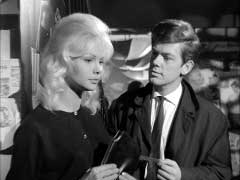
THAT KIND OF GIRL was released in the UK by Compton-Cameo – Tigon head Tony Tenser’s previous company with Michael Klinger (an outgrowth of their Compton Club) – importer of risque horror and sex films (their first release SOFT SKIN ON BLACK SILK was imported to the U.S. by the Radley Metzger’s similarly-themed Audubon Films), and in the U.S. by the short-lived Topaz Film Corporation under the title TEENAGE TRAMP. One of the film’s problems – or perhaps what sets it apart from most films of its ilk – is its depiction of Eva. While the film’s sympathies seem to lie with her in the first and third acts, the script is quite ambiguous about whether she really is a “tramp” during the middle half in which all three of the men – including stalker Elliot – are portrayed as victimized. She tells two of them that she’s never been with a man before; it turns out to be technically true, but for a long while it really does seem like her come-on line. THAT KIND OF GIRL is not the conservative statement of many of the earlier scare films masquerading as exploitation. Eva doesn’t learn the “error of her ways” with VD as a consequence of stringing multiple men along; the film’s important lesson is for all of its young characters: that sex outside of marriage (that is, ideal committed marriage) can be dangerous, and that sexual education is important. In some ways, it’s not unlike Jerry Gross’ later TEENAGE MOTHER, which – after its cheezily enjoyable dramatics – has its protagonist stressing that children are more likely to be harmed by ignorance about sex than by exposure in the form of education. Rather than condemning loose morals, the clinic doctor – who blames the parents for not educating their children – says those who indulge in pre- or extra-marital sex should do themselves the favor of being regularly tested. Eva is branded as a tramp by characters in the film, not by the film itself. Interestingly, the “Ban the Bomb” subplot is not treated as anti-establishment anarchy. The march is attended by a diverse group of people, and its presence in the plot seems less like window-dressing and more about real post-Blitz fears about the creation of even more devastatingly destructive weapons.
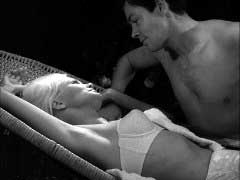 All
of the British cast either had or went on to achieve prolific TV and theatre
credits, and one wonders what they must have thought when given a script that
required them to discuss genital sores (Marlowe gets the mouthful of a line:
“I’ve never been to a doctor to tell him that I’m an unwed
mother and that the man who got me pregnant has VD”). THAT KIND OF GIRL
was Keil’s only British film credit, most of her work was in Italy. After
the Maurice Chevalier comedy LET’S GO BUST – co-directed by American
George Sherman (BIG JAKE) and Giuliano Carmineo (CASE OF THE BLOODY IRIS) –
she found a niche in late 1960s and 1970s sexploitation, particularly the Decamerotica
and Arabian Nights-esque films cashing in on Pier Paolo Pasolini’s “Trilogy
of Life” films, as well as the pre-CALIGULA erotic peplum films, westerns,
and Ernst von Theumer’s women-in-prison film THE BIG BUST OUT. Her later
credits were the obscure Alberto Cavallone arthouse erotica film ZELDA, the
Turkish-Italian giallo THE POLICE ARE BLUNDERING IN THE DARK, Bitto Albertini’s
ESCAPE FROM GALAXY 3 and a single German sex comedy THE INN OF 1000 SINS. Cinematographer
Peter Newbrook (THAT SMASHING BIRD I USED TO KNOW) noir-ish photography is a
dazzling mix of deep blacks and cool greys, while Malcolm Mitchell’s brassy
score feels more mechanical than improvisational. Mitchell’s only other
scoring assignment was THE YELLOW TEDDYBEARS, directed by this film’s
producer Robert Hartford-Davis. Hartford-Davis is known to genre fans as a director
in his own right; albeit of some of the uglier and clunkier examples of British
exploitation including THE BLACK TORMENT, BLOODSUCKERS/INCENSE FOR THE DAMNED
(a reductive adaptation of the intriguing Simon Raven novel “Doctors Wear
Scarlet”), the Peter Cushing plastic surgery slasher CORRUPTION, the misogynistic
THE FIEND/BEWARE MY BRETHREN, and the lost sexploitation film NOBODY ORDERED
LOVE starring Ingrid Pitt, Judy Huxtable and THAT KIND OF GIRL’s Weston
and Jarvis. Writer Jan Reed also had the features THE HAUNTED STRANGLER, JASON
AND THE ARGONAUTS, and FIRST MEN IN THE MOON, as well as a number of television
credits.
All
of the British cast either had or went on to achieve prolific TV and theatre
credits, and one wonders what they must have thought when given a script that
required them to discuss genital sores (Marlowe gets the mouthful of a line:
“I’ve never been to a doctor to tell him that I’m an unwed
mother and that the man who got me pregnant has VD”). THAT KIND OF GIRL
was Keil’s only British film credit, most of her work was in Italy. After
the Maurice Chevalier comedy LET’S GO BUST – co-directed by American
George Sherman (BIG JAKE) and Giuliano Carmineo (CASE OF THE BLOODY IRIS) –
she found a niche in late 1960s and 1970s sexploitation, particularly the Decamerotica
and Arabian Nights-esque films cashing in on Pier Paolo Pasolini’s “Trilogy
of Life” films, as well as the pre-CALIGULA erotic peplum films, westerns,
and Ernst von Theumer’s women-in-prison film THE BIG BUST OUT. Her later
credits were the obscure Alberto Cavallone arthouse erotica film ZELDA, the
Turkish-Italian giallo THE POLICE ARE BLUNDERING IN THE DARK, Bitto Albertini’s
ESCAPE FROM GALAXY 3 and a single German sex comedy THE INN OF 1000 SINS. Cinematographer
Peter Newbrook (THAT SMASHING BIRD I USED TO KNOW) noir-ish photography is a
dazzling mix of deep blacks and cool greys, while Malcolm Mitchell’s brassy
score feels more mechanical than improvisational. Mitchell’s only other
scoring assignment was THE YELLOW TEDDYBEARS, directed by this film’s
producer Robert Hartford-Davis. Hartford-Davis is known to genre fans as a director
in his own right; albeit of some of the uglier and clunkier examples of British
exploitation including THE BLACK TORMENT, BLOODSUCKERS/INCENSE FOR THE DAMNED
(a reductive adaptation of the intriguing Simon Raven novel “Doctors Wear
Scarlet”), the Peter Cushing plastic surgery slasher CORRUPTION, the misogynistic
THE FIEND/BEWARE MY BRETHREN, and the lost sexploitation film NOBODY ORDERED
LOVE starring Ingrid Pitt, Judy Huxtable and THAT KIND OF GIRL’s Weston
and Jarvis. Writer Jan Reed also had the features THE HAUNTED STRANGLER, JASON
AND THE ARGONAUTS, and FIRST MEN IN THE MOON, as well as a number of television
credits.

Director Gerry O’Hara started out in the industry as an assistant director in the late 1940s with prominent credits such as QUARTET, SO LONG AT THE FAIR, RICHARD THE III, EXODUS, CLEOPATRA and TOM JONES. Exploitation offered his first directorial effort with THAT KIND OF GIRL, and he would follow it up with the self-penned THE PLEASURE GIRLS. After a few TV stints, O’Hara moved onto more mainstream work with the thrillers MAROC 7 and THE AMSTERDAM AFFAIR and dramas like ALL THE RIGHT NOISES and THE BRUTE. He directed the first Harlequin Mills & Boon adaptation LEOPARD IN THE SNOW and then the train-wreck of a Jackie Collins novel adaptation THE BITCH (starring Joan Collins). O’Hara then became embroiled with Harry Alan Towers and a pre-Golan/Globus Cannon Films when he directed FANNY HILL (1983). He scripted and intended to direct a PHANTOM OF THE OPERA adaptation in the mid-1980s when Cannon had bought Elstree Studios; but Cannon was on the verge of bankruptcy when Giancarlo Peretti bought the company. Globus stayed with the company, but Golan left with the Peretti-purchased 21st Century Film Corporation (already liquidated of its grindhouse library that included titles like THE DEADLY SPAWN, MANHATTAN BABY [as EYE OF THE EVIL DEAD], and ALIEN CONTAMINATION) as his severance. Golan took PHANTOM OF THE OPERA with him to 21st Century Film Corporation and hired Duke Sandefur (GHOST TOWN) to scale down O’Hara’s script – for the move from Elstree to the less lavish studio settings in Hungary – (and presumably Freddy-fy it), and Dwight H. Little (HALLOWEEN 4) took over direction with Robert Englund the lead. O’Hara also scripted the Towers/Cannon TEN LITTLE INDIANS and the Towers “Sherlock Holmes” TV movie INCIDENT AT VICTORIA FALLS, but I have no idea if he was intended to direct either of them. His final film credit was the Towers-produced THE MUMMY LIVES (with Tony Curtis) – for Globus’ Cannon sister company Global Pictures – which had begun life with Ken Russell as director and Anthony Perkins, who was then replaced by Oliver Reed before both left the project. He was next slated to direct NIGHT TERRORS – also for Global Pictures and Towers – but was replaced by Tobe Hooper (who later directed the Towers’ produced THE MANGLER).
 PERMISSIVE
opens with a BFI restoration card before the BBFC X-certificate card, and the
single-layer, fullscreen presentation sports vivid colors, a spotless image
(there is one instance that looks like a jump-cut due to missing frames, but
this may also be a stylistic editing choice), and clean and strong 2.0 mono
audio. The film is available in the UK as a dual-format BFI “Flipside”
series edition which also featured the film’s trailer, Stanley Long’s
hour-long short BREAD (as well as 15 minutes of silent outtakes), the sex education
short ’AVE YOU GOT A MALE ASSISTANT PLEASE MISS?, and a 32-page booklet.
No trailer is included. Also a dual-format “Flipside” release in
the UK, THAT KIND OF GIRL also benefits from utilizing a BFI-restored master;
although both releases feature the UK cinema cut of the film deleting all instances
of nudity from the striptease act and all nudity from the sex scene between
Eva and Keith. The monochrome image is near-spotless with rare instances of
faint vertical black scratching. The DVD encoding does suffer from aliasing
on fine details (Eva’s striped shirt, a hi-fi speaker in the background
of a shot, and so on) but it is not distracting. The Flipside edition includes
an interview with Hartford-Davis, a collector’s booklet, and three short
films. The dual-format release also features three short films: J.B. Holmes’
THE PEOPLE AT NO. 9 is also a treatise on the consequences of loose behavior,
while Derek Knight’s NO PLACE TO HIDE and James Hill’s A SUNDAY
IN SEPTEMBER examined Britain’s nuclear worries (a subplot in the feature).
Despite the lack of extras, viewers may find the Jezebel Films disc an economical
alternative to the pricier BFI sets. (Eric
Cotenas)
PERMISSIVE
opens with a BFI restoration card before the BBFC X-certificate card, and the
single-layer, fullscreen presentation sports vivid colors, a spotless image
(there is one instance that looks like a jump-cut due to missing frames, but
this may also be a stylistic editing choice), and clean and strong 2.0 mono
audio. The film is available in the UK as a dual-format BFI “Flipside”
series edition which also featured the film’s trailer, Stanley Long’s
hour-long short BREAD (as well as 15 minutes of silent outtakes), the sex education
short ’AVE YOU GOT A MALE ASSISTANT PLEASE MISS?, and a 32-page booklet.
No trailer is included. Also a dual-format “Flipside” release in
the UK, THAT KIND OF GIRL also benefits from utilizing a BFI-restored master;
although both releases feature the UK cinema cut of the film deleting all instances
of nudity from the striptease act and all nudity from the sex scene between
Eva and Keith. The monochrome image is near-spotless with rare instances of
faint vertical black scratching. The DVD encoding does suffer from aliasing
on fine details (Eva’s striped shirt, a hi-fi speaker in the background
of a shot, and so on) but it is not distracting. The Flipside edition includes
an interview with Hartford-Davis, a collector’s booklet, and three short
films. The dual-format release also features three short films: J.B. Holmes’
THE PEOPLE AT NO. 9 is also a treatise on the consequences of loose behavior,
while Derek Knight’s NO PLACE TO HIDE and James Hill’s A SUNDAY
IN SEPTEMBER examined Britain’s nuclear worries (a subplot in the feature).
Despite the lack of extras, viewers may find the Jezebel Films disc an economical
alternative to the pricier BFI sets. (Eric
Cotenas)